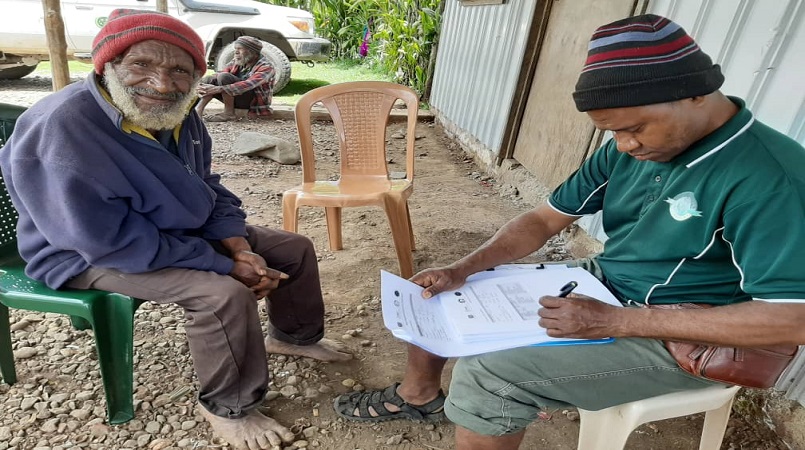
The Market for Village Farmers (MVF) Project has successfully completed a rapid household survey in Simbu, Jiwaka and Western Highlands provinces recently.
The team comprised of officers from MVF, Fresh Produce Development Agency (FPDA) and Department of Agriculture and Livestock who are based in the respective provinces.
MVF team leader Richard Alepa has acknowledged the lead farmers, aggregators, FPDA and DAL officers for their support in assisting MVF to complete the survey.
He said it was a learning experience to better understand the farmers, their experiences, challenges and ideas shared and how best MVF could assist.
“We want to help lead farmers and their contact farmers to better utilize MVF investments to aggregate fresh produce and reach bigger markets ultimately strengthening the value chain systems and improving farmer livelihoods,” he said.
The survey also discovered that farmers were selling their produce to different aggregators at times due to over-supply and low demand.
He said when a farmer supplied to their contact aggregator and if they purchased to their requirements, the farmer then had to sell to the second aggregator and even sell the remains at the open markets.
The team visited farms and farmers in the Kundiawa-Gambogl, South Wahagi in Juiwaka, Hagen Central, Tambil Nebilyer and parts of Dei districts.
MVF project which is implemented by FPDA is a loan facility funded by the International Fund for Agriculture Development (IFAD) to improve market accessibility for rural farmers.
The loan which was approved in 2017 was mainly to improve market and product accessibility for rural farmers. The first trench of the loan would cover Western Highlands, Jiwaka, Simbu, Eastern Highlands and Morobe for fresh produce and East New Britian for Galip Nut development and commercialization.
A market rapid value chain study was already done and is followed by the current study which is rapid household study which will then see the actual implementation in 2021 covering registered farmers as recommended by the aggregators and lead farmers.
The purpose of the study was to determine farmers current household ownership index and their farming status and access to formal markets.
This data and information will provide MVF and business service providers to design relevant interventions to benefit project stakeholders which are lead aggregators and farmers.
The MVF project team had discovered eight partnerships in three provinces they have visited with two in Simbu, three in Jiwaka and three in Western Highlands.
The project is looking at engaging 25,000 farming households in the project life. The first call one is targeting 5,000 households and also to fully develop 250 SMEs in the project life in line with fresh produce sub sector goals under MTDP III to increase government revenue and inclusive economic growth.
The recent study has surveyed over 500 farming households. A detailed survey in the later phase of the project will profile 25,000 households.
The rapid household survey is conducted to comply with the International Fund for Agriculture Development’s (IFAD) guidelines on core outcome indicators and MVF result framework to measure results during the project intervention.
The MVF National Coordinator John Kendiga who was part of the team said the aim of the project was to bring market to the rural farmers.
He said where there are needs for road accessibility to the farms, MVF would partner with the districts and provincial governments to get the roads through.
“We will not build the entire roads in a big way but assist where we can on a kina for kina partnership so that we get to the farmers to bring their produce to the markets,” he said.
Mr Kendiga said once the project life is over within the next five years, the provinces and districts can take charge of the infrastructure so that farmers continue to use the roads to bring their produce to the markets.
He also encouraged more young people to participate in farming so that they would not only benefit from the services provided but take farming as a business and part of their lives into the future.
Farmers and aggregators that were visited have all expressed their happiness towards the team for their commitments to deliver markets to their doorstep.
Accessing markets has been an ongoing issue for fresh produce farmers in the highlands for years, said Robinson Kales of Kales Fruits and Vegetables Supplies, an aggregator based in Jiwaka.
Mr Kale supplies vegetables to mines and shops in Port Moresby on a weekly basis and has contact farmers who supply to him.
He said he could not buy everything from his farmers as he had limited orders and was concerned about his contact farmers whose supplies could not always make it to the formal markets.
With the support from MVF through the National Government, farmers should be able to have direct access to the markets without the fear of losing their produce, he said.
Rural farmers play a critical role in the fresh produce value chain but often face a lot of challenges.
This includes high cost of farm inputs, lack of adequate know-how on production practices, post-harvest practices, inadequate knowledge on formal market requirements and deteriorating road conditions are some of the setbacks that hinder farmers to do farming as a business.
The Market for Village Farmers – Maket Bilong Villis Fama (MVF) is a Government of PNG project financed by IFAD, executed by National Department of Agriculture & Livestock, and implemented by Fresh Produce Development Agency (FPDA). The Project Development Objective (PDO) is to achieve sustainable, increased returns to village farming households from market-oriented production.
